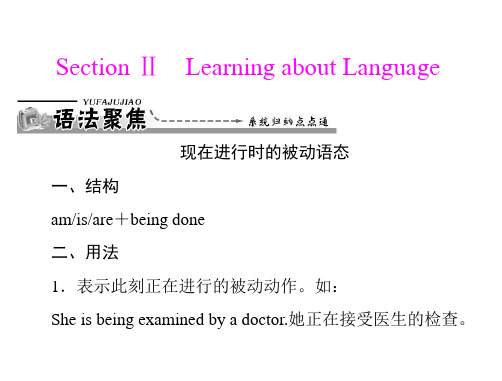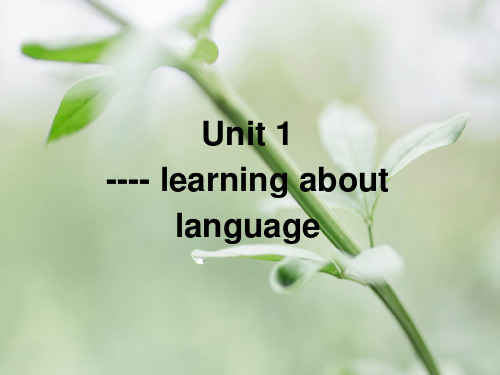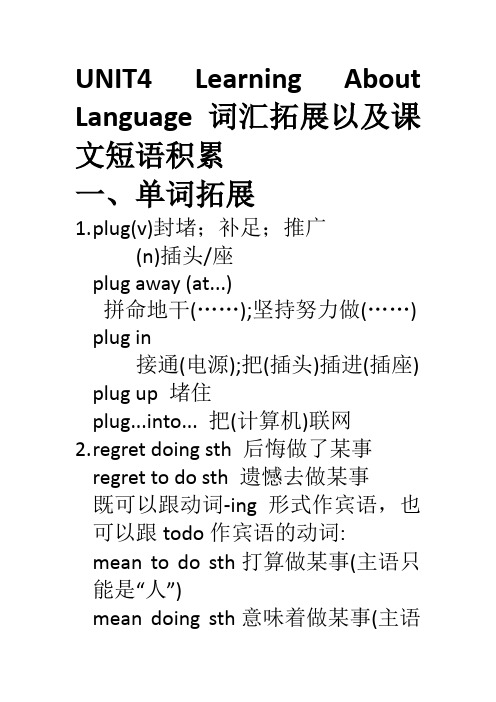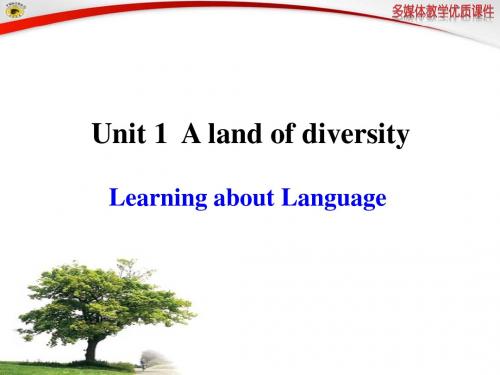Learning about language
人教版_高一英语必修二_Unit1_Learning_about_Language_长难句型精析

Unit1 Learning about Language 长难句型精析1. sb. be doing…when…某人正在做……. 就在这时…sb. had just done sth. when…某人刚做完某事,这时突然……sb. was about to do sth. when…某人正要做某事,这时突然……sb. was on the point of doing sth. when…某人正要做某事,这时突然……教材原文One day he was looking in a second-hand furniture shop when he saw an amazing object among the many different vases and jewels. 一天,他正在逛一家二手家具店,就在这时他在众多不同的花瓶和珠宝首饰中看到了一个令人惊奇的东西。
本句是“sb. be doing. when. . …”结构,when在句中为并列连词。
经典例句①He was sleeping when there was a knock at the door.他正在睡觉,这时突然有人敲门。
②I was studying when suddenly my phone rang.我正在学习,这时我的电话突然响了。
③The woman was about to open the door when she heard a strange sound from inside. 这位女士正要开门,这时她听到从里面传来一个奇怪的声音。
④She had just finished the dinner when her father came in.她刚吃完饭,她的父亲就进来了。
2. see+宾语+宾补see是感官动词,其宾语补足语有四种形式,即:see+宾语+教材原文The old man saw some Germans taking apart the Amber Room and removing it. 那位老人看到一些德国人在拆卸并移走琥珀屋。
unit4 section ⅱ learning about language课件 新人教版必修2

这张照片这些天一直在展示。
五、句型变换 现在进行时的被动语态与现在分词的被动式 being done 均 可表示此刻正在进行的被动动作,因此它们之间可以进行句型 转换。如: Please tell me something about the meeting which is being held now.=Please tell me something about the meeting being held
3.“介词 in/onห้องสมุดไป่ตู้under 等+名词”构成的介词短语常含有
被动意义,可代替现在进行时的被动语态,此时名词前一般
不用冠词。如: The bridge is under repair/construction
(=is being repaired/constructed).
大桥正在建设中。 The picture is on display (=is being displayed) these days.
Folk song is being sung next.下面将唱一首民歌。
2.一些表示状态、心理活动、拥有、存在等的动词,一般 不用于现在进行时的被动语态,而用一般现在时的被动语态表
示此时此刻或目前主语正承受谓语动词的动作。如:
Wang Li, come here.You're being wanted on the phone.(×) Wang Li, come here.You're wanted on the phone.(√) 王丽,过来,有你的电话。
(4)having been done 是现在分词完成式的被动,表示完成和
被动,不作定语和补足语; (5)done 是过去分词,表示完成和被动,作定语、状语、补 足语。
高中英语Unit2SectionⅡLearningAboutLanguage新人教版选择性必修第一册

2.补全句子 ①This term will end in July and _I__w__il_l _b_e__g_o_i_n_g__b_a_c_k__h_o_m_e__i_n__t_h_e _co_u_n_t_r_y. 这个学期将于7月结束,我要回到乡下的家里去。 ②I ____sh_a_l_l_b_e_v_i_s_it_in_g__m_y__g_r_an_d_m__o_t_h_er_____at 3 o’clock this afternoon. 今天下午3点我将看望我的祖母。
2 1.单句语法填空 ①Jane can’t attend the meeting at 3 o’clock this afternoon because she __w_i_l_l _b_e_te_a_c_h_i_n_g_____(teach)a class at that time. ②―Could I use your car tomorrow morning? —Sure.I ___w_i_ll_b_e__w_r_it_i_n_g____(write)a report at home. ③At ten o’clock tomorrow, she __w_i_ll_b_e__w_o_r_k_in_g_____(work) in her
3.表示预测可能会发生的事。 When I arrive home, my mother will probably be waiting for me for lunch. 当我到家时,我妈妈可能正在等我吃午饭。 If we keep working hard like this, we will be making a miracle. 如果我们继续这样努力工作的话,我们将会创造奇迹。
LearningaboutLanguage英语课文教案范例

Learning about Language 英语课文教案范例一、教学目标1. 知识目标:(1)学生能够理解并运用本课中的新词汇和短语。
(2)学生能够听懂、说准本课中的对话和课文内容。
(3)学生能够掌握一定的阅读技巧,如预测、推断等。
2. 能力目标:(1)学生能够运用所学知识进行日常交流。
(2)学生能够独立完成阅读任务,提高阅读理解能力。
(3)学生能够通过小组合作,提高团队协作能力。
3. 情感目标:(1)激发学生学习英语的兴趣,增强自信心。
(2)培养学生积极思考、主动探究的学习态度。
(3)培养学生尊重文化差异,拓宽国际视野。
二、教学内容1. 课文主题:介绍不同国家的文化习俗。
2. 课文内容:课文中介绍了英国、美国、中国等国家的饮食、节日、问候语等文化习俗。
3. 词汇短语:食物、节日、问候语等相关词汇和短语。
三、教学重点与难点1. 教学重点:(1)学生能够掌握本课中的新词汇和短语。
(2)学生能够听懂、说准本课中的对话和课文内容。
(3)学生能够运用所学知识进行日常交流。
2. 教学难点:(1)正确运用本课中的词汇和短语。
(2)理解并运用阅读技巧。
四、教学方法1. 情境教学法:通过设置真实的情境,让学生在实践中学习和运用英语。
2. 任务型教学法:通过完成各种任务,提高学生的综合语言运用能力。
3. 交际法:鼓励学生积极参与课堂互动,提高口语表达能力。
五、教学步骤1. 热身活动(5分钟):(1)教师与学生进行简单的英语对话,检查学生的英语水平。
(2)学生进行小组活动,讨论各自的兴趣爱好。
2. 引入新课(10分钟):(1)教师展示课文图片,引导学生预测课文内容。
(2)教师播放课文录音,学生跟读并模仿语音语调。
3. 学习课文(15分钟):(1)教师引导学生逐段阅读课文,理解课文内容。
(2)教师讲解新词汇和短语,学生进行实际运用。
4. 课堂互动(10分钟):(1)教师组织学生进行角色扮演,模拟课文中的场景。
(2)学生进行小组讨论,分享各自的观点和经历。
高一英语必修1课件5-3Learning about Language

Unit5 · 第三课时
成才之路 ·英语 ·人教版 · 必修1
[拓展] lose one's heart to爱上;喜欢上 learn...by heart 记住;背过 put one's heart into sth. 对„„全力以赴;一心一意
Unit5 · 第三课时
成才之路 ·英语 ·人教版 · 必修1
1.when表示时间,在定语从句中作时间状语,其先行 词一般为表示时间的名词。如: October, 1st 1949 was the day when the People's Republic of China was founded. 1949年10月1日是中华人民共和国成立的日子。
Unit5 · 第三课时
Unit5 · 第三课时
成才之路 ·英语 ·人教版 · 必修1
(3)表示所属关系或整体与部分关系时,常用...of which/whom引导定语从句。 ①I have three brothers, two of whom are teachers. 我有三个兄弟,其中两个是教师。 ②She bought five books today, three of which are about English grammar. 她今天买了五本书,其中三本是关于英语语法的。
Unit5 · 第三课时
成才之路 ·英语 ·人教版 · 必修1
4.I have a new friend who/that is named Mary. 5.Have you seen a dictionary whose cover is red? 6.This is the first English book that/不填 I have ever read. 7.I'll never forget the people and things that/不填 I saw in that factory. 8.Things that/which/不填 famous people own are often sold.
人教高中英语必修1Unit1learning about language(共53张PPT)

whether / if引导的名 词性从句
umbrella, Mary?” John asked Mary if
asked John.
that was her
umbrella.
直接引语(变化前) 间接引语(变化后)
特殊疑问句
wh-词引导的名词性从
“Mary, when will 句
you return me the John asked Mary when
I told her that I had done my best.
c. The changes of the tenses
Direct Indirect Direct Indirect speech speech speech speech
Simple Simple present past
Simple future
last year the year before/the previous year, etc. a week ago a week before/a week earlier, etc.
e. Other cases
Direct speech Indirect speech
this
that
these
Unit 1 ---- learning about
language
Unit 1 Grammar
Direct Speech & Indirect Speech statements and questions
Objective
学习并掌握直接引语和间接 引语的转换方法,并能在具 体场景下正确使用。
语法讲解建议采用归纳法,如 尽可能多的呈现一些相关例句, 或可让学生从已学课文中找相 应例句,引导学生试着从所观 察到的语言现象中总结出语言 规则和语法规律。
高二英语人教版 选择性必修四 Unit 5 Learning About Language

4 I have always been passionate about books, so I want to be a librarian . By providing a
Activity 2
Complete the sentences with the correct forms of the words you have learnt in this unit. Circle the part of speech. Then think of more words that can be used in both noun and verb forms.
Activity 3
Use the words in the box to complete the following excerpt from a student’s speech.
commit define
bounce around in common
rather than come tቤተ መጻሕፍቲ ባይዱ a conclusion
rather than on something more meaningful?
commit define
bounce around in common
rather than come to a conclusion
radium
had a great influence on
Please close your eyes and think of someone professional and successful. It could be a famous entrepreneur, a great leader, a scientist or an artist, or a teacher who had a great influence on you. My choice would be Marie Curie, who discovered radium . For me, she is great not just because she was world-famous, but because she made great contributions to mankind. Being a female scientist was much less common in her time, but in spite of this she devoted her life to her career. So I have come to the conclusion that if you want a great career, you need to
高中英语人教版(必修第一册) 复习课件:UNIT 5-Learning About Language

[练通]——用care的相关短语填空 ①Wendy cares little __a_b_o_u_t __ her salary, because she cares ____fo_r___
the children and likes to stay with them. ②When traveling, you must _ta_k_e_c_a_re_o_f_ your health. [写美]——微写作_o_w_n_t_o_u_s_a_ll_t_h_at__ light travels in straight lines.
Festival. ③_W__h_e_th_e_r _ he will attend the meeting or not doesn't matter. ④It is obvious to the students ___t_h_at___ they should get well prepared
语法规则 一、主语从句的定义
在主从复合句中充当主语的从句即为主语从句。主语从句的位置可 以在句首, 也可以用it作形式主语, 主语从句放在后面。
❶What please me most is that their artistic talent is extremely shocking. 最让我高兴的是,他们的艺术天赋是非常惊人的。 ❷It worried the mother that her son was always playing computer
2.连接代词(who, whom, whose, what, which, whichever, whoever, whomever, whatever等)
人教课标版高中必修2 Unit3_Learning_about_Language_词汇导图语境速记

Learning about Language
词汇导图语境速记
make use of属于“动词+名词+介词”型短语,一般考查:一方面将短 语中的名词提前作先行词,后接定语从句;另一方面用被动语态。
漫画助记
Make full use of every chance to speak English. 要充分利用一切机会说英语。
漫画助记
The Red Army soldier will give nothing away. 这个红军战士不会泄露任何事情。
He didn't give in to the enemies but his partner chose to give in to the enemies and gave away state secrets to them. 他没有向敌人屈服,但是他的同伴选择向敌人投降,并且把国家 机密泄漏给了他们。
His dream of being a firefighter has been realized but my dream of being a teacher has not come true. 他要当消防员的梦想已经实现了,但是我要当老师的梦想还没有 实现。
漫画助记
He dreamt of becoming an astronaut,and his dream came true. 他梦想当一名宇航员,并且他的梦想成真了。
Unit1Learningaboutlanguage非限制性定语从句课件高中英语人教版选择性

限制性定语从句中,as常用于下列句式
such + 名词 +as +从句
像……一样的;像……之类
the same +名词+ as +从句 和…同样的
e.g.: I have the same book as he has.
We have found such materials as are used in their factory.
In the class, there are 36 students, who are interested in pop
music.这个班有36个学生,他们都喜欢流行音乐。
In the class, there are 36 students, and they are interested in pop music.
3.which指事物,在定语从句中作主语、宾语或 表语,作宾语时可省略。The young man was very happy to get back the gold ring (which) he had lost on the train.那个年轻人领回了在火车上丢失的 金戒指,非常高兴。The little girl is having an apple which is big and red.小女孩正在吃一个又大 又红的苹果
常译成与主句并列的句子
关系词一般不可省略 不能用that, why引导
Translate the following sentences.
In the class, there are 36 students who are interested in pop music.
这个班有36个喜欢流行音乐的学生。
Unit+2+Learning+About+Language(人教版2019选择性必修第一册)

04. Activity 3
Paraphrase the sentences using the words and phrases in brackets.
explain
Tips • Think of the given word’s meaning; • Read the sentence and find out the part that has the similar
04. Activity 3
2. We will probably benefit from remote-controlled houses. (potentially)
potentially adv. with possibility of becoming actual
We will potentially benefit from remote-controlled houses.
04. Activity 3
4. It is a good habit to make certain that you know what is happening with your blood pressure. (keep track of)
keep track of : record It is a good habit to make certain that you keep track of what is happening with your blood pressure.
combine against
联合起来对抗……
拓展
combination n. in combination (with) combined adj.
高一英语必修1课件2-3 Learning about Language

Unit2 · 第三课时
成才之路 ·英语 ·人教版 · 必修1
答案:B
祈使句的直接引语变为间接引语时,要在祈
使句的动词原形前加上不定式符号to,同时去掉please,故 选B。
Unit2 · 第三课时
成才之路 ·英语 ·人教版 · 必修1
如果祈使句是否定句,则在不定式前加not,即构成句 型: ask/tell/order sb. not to do sth. “Don't touch anything in the lab”,she said. She told us not to touch anything in the lab.
Unit2 · 第三课时
成才之路 ·英语 ·人教版 · 必修1
(2)vt. 请求,要求。常见用法: request sth. 要求/请求„„ request sb. to do sth. 请求某人做某事 request that sb.shoulddo sth. 要求„„ ①He requested help from his friends. 他请求朋友们帮忙。 ②You are requested not to smoke in the restaurant. 请不要在饭馆里吸烟。
答案:(2)he(should) (3)you to come
Unit2 · 第三课时
成才之路 ·英语 ·人教版 · 必修1
语法精讲精练
Unit2 · 第三课时
成才之路 ·英语 ·人教版 · 必修1
直接引语变间接引语(二) 祈使句的直接引语变间接引语 (1)直接引语如果是祈使句,变为间接引语时,要将祈使 句中动词原形变成不定式,并在不定式的前面加上 ask/tell/order等动词。构成句型:ask/tell/order sb. to do sth.。 “Open the window,”he said. →He told me to open the window.
Learning+About+Language+单词拓展以及课文短语清单 高中英语人教版(2019)

UNIT4 Learning About Language 词汇拓展以及课文短语积累一、单词拓展1.p lug(v)封堵;补足;推广(n)插头/座plug away (at...)拼命地干(……);坚持努力做(……) plug in接通(电源);把(插头)插进(插座) plug up 堵住plug...into... 把(计算机)联网2.r egret doing sth 后悔做了某事regret to do sth 遗憾去做某事既可以跟动词-ing形式作宾语,也可以跟todo作宾语的动词:mean to do sth打算做某事(主语只能是“人”)mean doing sth意味着做某事(主语不能是“人”)forget to do sth 忘记做某事forget doing sth 忘记曾经做过的事remember to do sth 记住将要做的事remember doing sth 记得曾经做过的事try to do sth 设法做某事;尽力做某事trying doing sth 试着做某事;尝试做某事stop to do sth停下正在做的事去做另一件事stop doing sth停止正在做的事go on to do sth做完某事后接着做另一件事go on doing sth继续(不停地)做正在做的事can't help to do sth不能帮助做某事can't help doing sth 不禁做某事3.d isabled (adj) 有残疾的;丧失能力的搭配:the disabled残疾人(作主语时,谓语动词用复数)【词语积累】(1)disable (vt).使残疾;使不能运转disable sb.使某人残疾disable the alarm 破坏警报器(2)disability (n).残疾,缺陷,障碍a physical/mental disability生理缺陷/心理障碍people with disabilities 残疾人(3)able (adj).能的,有能力的→unable (adj).不能的,无能力的be able/unable to do sth.能够做某事/不能做某事(4)enable (vt).使能够enable sb.to do sth.使某人能够做某事4.r esign(vi.& vt). 辞职;辞去resign from+工作单位(a company, a committee, a factory, etc.)从……辞职resign as +身份名词(manager, chairman,etc.) 辞去……职务resign oneself to (doing) sth顺从;听任;只好接受(to 是介词)resign one's position/post/seat辞去某人的职务resignation (n).辞职;辞里;辞职信;顺从a letter of resignation 辞职信offer/hand on in one's resignation某人呈递/上交辞职信5.d eserve (v) 值得;应得;应收(不用于进行时态)deserve+n./pron. 值得……,应得……deserve doing/to be done值得被……;应该被……(主语是动作do的承受者)deserve to do 应该做……;值得做……(主语发出动作do) deserved (adj) 应得的;该受的归纳拓展:动名词用主动形式表示被动意义的搭配:(1)want/need/require doing(某事)需要被……(=want/need/require to be done)(2)be worth doing(某事)值得被……4. be responsible for..对……负责;是……的原因【词语积累】responsibility (n).责任;负责a sense of responsibility责任感take on/ accept/ shoulder (a/the) responsibility 承担/担起责任搭配take responsibility for... 对……负责have responsibility for... 对……有责任It's one’s responsibility to do sth.某人有责任做某事5.(1)名词doubt 的其他句型:There is some doubt about/of….对……有些疑问。
Unit 1 Learning about language (教学课件)-高中英语

TB P.4 Ex.1 Find the words from the previous pages with the following prefixes or suffixes. Then add two words for each prefix or suffix, and explain their meanings.
Prefix Words Prefix Words Suffix Words Suffix Words
re-
micro-
-ory
-ial
dis-
trans-
-ion
-ology
Prefix redis-
microtrans-
re + unite (v. 联合) reunite (v.) – to unite again 再联合 ;重逢
blocks a key protein in the body cells that is to __b_la_m__e____ for the spread of coldcausing virus. Targeting the host rather than __in_f_e_c_t_io_n__ was a bit non-traditional but
n. 肺
副作用
Topic
British scientists believe they may have found a way to fight the sentence
common cold. It blocks a key protein in the body cells that is to
高中英语人教版(必修第一册) 复习课件:UNIT 2-Learning About Language

❷I'll be reading a book at 10:00 tomorrow. 明天十点我将正在看书。
2.将来进行时通常表示的是对将来事实的简单陈述, 而一般将来 时除表示时间概念外, 还带有感情色彩。
❶Tom will be cutting grass tomorrow. 汤姆明天将正在割草。
balanced diet. 重要的是你应该试着将锻炼和均衡饮食结合起来。
[练通]——单句语法填空 ①[2022·天 津 3 月 卷 ]As working from home becomes increasingly common, people are finding it easier t_o_c_o_m_b_in_e_ (combine) parenthood with
off the TV when we forget. ②(教材P14)In the future, we will be using advanced technology every day for
automatic control of just about everything in our home. ③(教材P14)In addition, your smart home will be monitoring your health for
[佳句] Mum, I'm very busy, so I can't help to clean the room today. 妈 妈, 我很忙, 所以今天我不能帮忙打扫房间了。
[练通]——单句语法填空 ①I wish we could help him _(_to_)_e_a_rn__ (earn) money. ②She can't help __e_a_ti_n_g__(eat) up the whole delicious food on the table. [写美]——微写作 ③当祖国需要我们时, 我们必须尽力。
高中英语选修二(人教版)2-2Learning About Language 教学课件

Ⅲ.重点句型 The biggest reason _w_h_y_h_e__lo_v_e_s_C__h_in_a_, however, is that he
(1)expectations of... 对……的期望 with expectations 怀着希望 live up to/meet (one's) expectations
达到(某人的)期望,如(某人)所愿 (2)contrary to/against/beyond expectation
出乎意料/超出预期 in (the) expectation of... 预计会有……,预料……
consideration. ③Those who continuously acquire new knowledge that they can
apply ___to_____ their work are more likely to succeed.
4.exposure n.[sing.U]接触,体验 [U]暴露;面临,遭受(危 险或不快) [U](在电视、报纸等上的)亮相,被报道;揭露
enjoys being with Chinese people. 然而,他热爱中国的最大原因是他喜欢和中国人在一起。
►第一ed adj. 积极的;主动的 (1)motivate vt. 成为……的动机;激发;激励 motivate sb. to do sth. 激励某人做某事 (2)motivation n.[U] 动力;积极性; [C] 动机 motivation for (doing) sth. (做)某事的动机
Unit 1 Learning about Language

Learning about Language
1.To understand what a Noun Clause is. 2.To learn about Subject Clause, Predicative Clause,
Object Clause and Appositive Clause.
3.表语从句
在句中作表语的从句称为表语从句;学习表语从句
应该注意以下几点。
(1)通常只用that引导表语从句的情况。
①句子的主语为 the reason 时,表语从句采用 that 引
导,表示原因,此时不用because。
The reason why she was ill was that she had eaten
③It is+过去分词(said, reported, thought, expected,
decided, announced, arranged, etc.)+that...
It has been suggested that much should be done to
prevent the river from being polluted.
②(2013•北京高考)Experts believe ______ people can waste less food by shopping only when it is necessary. A. why B. where C. that D. what
【解析】选C。考查名词性从句。句意:专家们相 信人们只在必要的时候购物能减少食物的浪费。 that引导宾语从句,后面句子不缺少任何成分,只 起连接作用,故使用that。
- 1、下载文档前请自行甄别文档内容的完整性,平台不提供额外的编辑、内容补充、找答案等附加服务。
- 2、"仅部分预览"的文档,不可在线预览部分如存在完整性等问题,可反馈申请退款(可完整预览的文档不适用该条件!)。
- 3、如文档侵犯您的权益,请联系客服反馈,我们会尽快为您处理(人工客服工作时间:9:00-18:30)。
我们还是去看一下吧。 我们还是去看一下吧。
must的用法 的用法
1. 一个人的行为必须有君子风度。 一个人的行为必须有君子风度。
One must behave like a gentleman. 2. 我们绝不要浪费时间。 We mustn’t waste our time. 3. 我明天必须去吗? 我明天必须去吗? Must I go tomorrow? Yes, you must./please.
No, you needn’t./ No, you don’t have to.
4. 他告诉我5点钟我必须在那。 他告诉我 点钟我必须在那。 点钟我必须在那
He told me that I must be there at five.
5. 你从早晨起就没吃东西,你肯定饿了。 你从早晨起就没吃东西,你肯定饿了。 You haven’t eaten anything since morning, you must be hungry
6. He is as honest as he can be. 他非常诚实。 他非常诚实。
could的用法 的用法
1. 那时我们认为那故事不可能是真的。 那时我们认为那故事不可能是真的。
At that time we thought the story could not be true. 2. 她问可不可以把书拿出屋去。 She asked whether she could take the books out of the room. 3. The climate change could bring the planet to the edge of diasters. 气候的变化将会将地球推向灾难的边缘。 气候的变化将会将地球推向灾难的边缘。 3. 彼得周末可能去伦敦,但我拿不准。 彼得周末可能去伦敦,但我拿不准。 Peter could go to London this weekend, but I doubt it. 4. 我刚六岁就能游泳。 我刚六岁就能游泳。
I asked her if I might call on her. 2. 他们都说他圣诞节前可能回家。 They all said that he might come home before Christmas.. 3. 我想你可能要看一些东西,所以我给你带来了几本书。 我想你可能要看一些东西,所以我给你带来了几本书。 I think you might like something to read, so I have brought you some books. 4. 当然我也有可能是错的。 当然我也有可能是错的。
Of course I might be wrong.
5. 我可以和你谈一谈吗? 我可以和你谈一谈吗?
6. 当心!你可能被车撞到。 当心!你可能被车撞到。
Might I have a word with you?
Look out! You might be knocked by a car. 7. 如果他在这,你可能会得到他的帮助。 如果他在这,你可能会得到他的帮助。 If he were here, you might get some help from him.
may的用法 的用法
1. 你可能是对的。 你可能是对的。
You may be right. 2. She may not know the truth. 她可能不知道真相。 她可能不知道真相。 3. 她可能会在哪里呢? 她可能会在哪里呢? Where can she be? 4. 可以告诉我你的名字吗? 可以告诉我你的名字吗? 5. 如果可以的话我明天给你打电话。 如果可以的话我明天给你打电话。
与may/might有关的惯用语 有关的惯用语
1. You may well be proud of him. 你有足够的理由为他骄傲。 你有足够的理由为他骄傲。 2. There is nothing to do, so I may as well go to bed. 没什么事可做,我还是上床睡觉好了。 没什么事可做,我还是上床睡觉好了。
如:他准是回家了。 他准是回家了。
He must have gone home.
他一定在等我们。 他一定在等我们。
He must be waiting for us.
情态动词包括: 情态动词包括:
cught (to), shall, should, will, would, need, dare
与can有关的惯用语 有关的惯用语
1. 我禁不住笑起来。 我禁不住笑起来。 I can’t but laugh. (I can’t help laughing.) 2. 我可不能再等下去了。 I can’t stand waiting any longer.
3. 过马路时,再怎么小心也不为过。 过马路时,再怎么小心也不为过。 4. 我们怎么强调英语的重要性也不过分。 我们怎么强调英语的重要性也不过分。
1. 我可以在这里吸烟吗? 我可以在这里吸烟吗? Can(may) I smoke here? 2. 你可以回到座位了。 You can(may) go back to your seat.
3. 它不可能是真的。 它不可能是真的。 4. 月亮不可能长圆。 月亮不可能长圆。
It can’t be true.
Modal verbs
·情态动词的语法特征 情态动词的语法特征
I. 情态动词的形式与含义
情态动词是用来表达看法或意见, 情态动词是用来表达看法或意见,提出建议或表 现说话者的态度、礼貌等。情态动词有一定词义, 现说话者的态度、礼貌等。情态动词有一定词义, 和另一动词构成谓语, 和另一动词构成谓语,在各种人称后都用同样的 形式。 跟不定式外, 形式。除ought跟不定式外,其他情态动词都跟 跟不定式外 动词原形,有时跟这动词的完成式或进行式。 动词原形,有时跟这动词的完成式或进行式。
情态动词的用法 can/could
Can的用法: 的用法: 的用法 1. 我能举起这块石头。 我能举起这块石头。 I can lift this stone. 2. 如果你闭上眼睛,你就看不见。 如果你闭上眼睛, If you shut your eyes, you can’t see.
3. 我会说英语。 我会说英语。
The moon can’t always be at the full. 5. 这消息是真的吗? 这消息是真的吗? Can the news be true? 6. 每个人在一生中都有可能犯错误。 每个人在一生中都有可能犯错误。 Everyone can make mistakes in his life. 7. 你怎么能这样粗心? 你怎么能这样粗心? How can you be so careless?
May I know your name?
I shall call you tomorrow if I may.
6. Man does not live that he may eat, but eats that he may live.
人生存不是为了吃饭,而吃饭是为了生存。 人生存不是为了吃饭,而吃饭是为了生存。 7. Try as he may, he can’t find her. 尽管他努力了,但他还是没能找到她。 尽管他努力了,但他还是没能找到她。
I can speak English.
4. 你会用筷子吗? 你会用筷子吗?
Can you use chopsticks? 5. 有什么事我能为你做的吗? 有什么事我能为你做的吗? Is there anything I can do for you? 6. 他长大后就能养家了。 他长大后就能养家了。 When he grows up, he will be able to surpport his family.
6. Why must it rain on Sunday? ? 干嘛非要在星期天下雨? 干嘛非要在星期天下雨? 7. Just when we were ready to go away for holiday, the baby must catch cold. 正当我们要外出度假时,宝宝偏偏感冒了。 正当我们要外出度假时,宝宝偏偏感冒了。
6. 你能抽出一分钟时间来跟我解释一下这件事吗?. 你能抽出一分钟时间来跟我解释一下这件事吗?
Could you spare one minutes to explain this to me? 7. 他怎么会这样无礼? 他怎么会这样无礼? How could he be so rude? 8. 我多么希望能在空中飞 ! How I wish I could fly in the sky?
I could swim when I was only six.
5. 大火迅速蔓延到整幢大楼,但大家都逃了出来。 大火迅速蔓延到整幢大楼,但大家都逃了出来。
The fire spread to the building quickly but everybody was able to escape/managed to escape.
1. May our friendship be ever lasting!
愿我们的友谊地久天长。 愿我们的友谊地久天长。
2. May you make progress day by day!
祝你天天进步! 祝你天天进步!
might的用法 的用法
1. 我问她我可不可以拜访她。 我问她我可不可以拜访她。
II. 情态动词的特点: 情态动词的特点:
1. 每个情态动词都有自己的基本含义。 每个情态动词都有自己的基本含义。 2. 没有人称和数的变化,即情态动词第三人称单数 没有人称和数的变化, 不加-s。 不加 。 3. 除could, should, might, would有时 间接引语 有时(间接引语 有时 被看作是can, shall, may, will的过去式外, 的过去式外, 中)被看作是 被看作是 的过去式外 情态动词本身没有时态变化。 情态动词本身没有时态变化。 4. 不能独立使用,它和后面的动词构成谓语。 不能独立使用,它和后面的动词构成谓语。 5. 情态动词 除ought 和have 外,后面只能接不带 to 的不定式。 的不定式。 6. 情态动词没有非谓语形式,即没有不定式,分词 情态动词没有非谓语形式,即没有不定式, 和动名词等形式。 ,和动名词等形式。 7. 除shall外都可用来表推测。 外都可用来表推测。 外都可用来表推测
